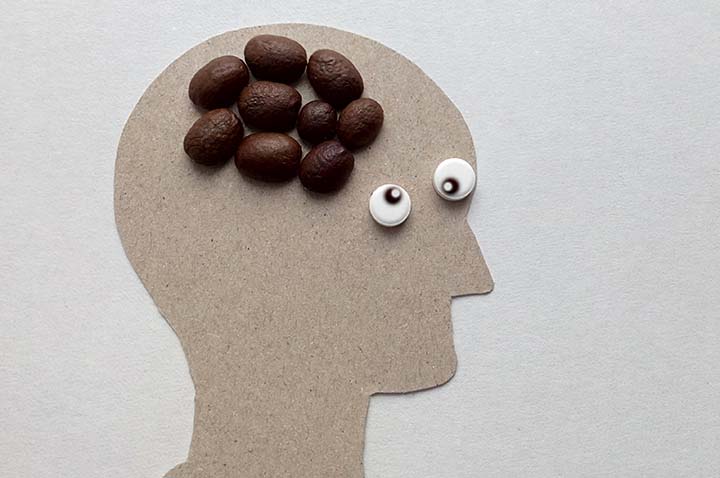Blog
What You Need to Know About Caffeine and Dementia
You already knew that your morning cup of coffee is a miracle worker. Or maybe you enjoy the quick buzz that a delicious Seattle Gummy Mocca Shot energy chew gives, and know how much it helps you have steady energy and a clear mind. But there’s some new science out that shows how caffeine can work more miracles than just waking us up in the morning. Researchers have identified in caffeine the potential to boost an enzyme in the brain shown to protect against dementia. Alertness, focus, energy, and protection against a degenerative disease of aging? Yes, please!
Caffeine has well-known short-term stimulating effects on the central nervous system, but the long-term impacts on cognition have been less clear. Scientists from Indiana University (IU) just gave those of us, who live on coffee and tea, another reason to enjoy that steaming cup of mocha. It turns out that caffeine not only gives you that extra boost in the morning but also protects you against dementia in your old age.
The Indiana University Study
A study by Indiana University researchers has identified in caffeine one of the 24 compounds with the potential to boost an enzyme in the brain shown to protect against dementia.1 The protective enzyme, called NMNAT2, plays two roles in the brain: a protective function to guard neurons against stress and a “chaperone function” to combat misfolded proteins, which accumulate in the brain as “plaques” due to aging. Misfolded proteins have been linked to neurodegenerative disorders such as Alzheimer’s, Parkinson’s, and Huntington’s diseases, as well as amyotrophic lateral sclerosis, also known as ALS or Lou Gehrig’s disease. So, compounds in coffee can help to keep your brain “clean” of misfolded proteins, and they also protect neurons from stress.
To identify substances with the potential to affect the production of the NMNAT2 enzyme in the brain, the researchers screened over 1,280 compounds, including existing drugs. A total of 24 compounds were identified as having the potential to increase the production of NMNAT2 in the brain. One of the substances shown to increase the production of the enzyme was caffeine, which also has been shown to improve memory function in animal models genetically modified to produce high levels of misfolded proteins.
To confirm the effect of caffeine, IU researchers administered caffeine to mice modified to produce lower levels of NMNAT2. As a result, the mice began to produce the same levels of the enzyme as normal mice. This means that caffeine increased the production of the protective enzyme in the brain and therefore could potentially lead to the protection of the brain against dementia.
Other Supporting Evidence
This UI research supports earlier epidemiology studies showing the protective effect of caffeine in dementia and Alzheimer’s disease. For Example, the Cardiovascular Risk Factors, Aging, and Dementia (CAIDE) study by Finland researchers in 2010 showed that drinking 3-5 cups of coffee per day at midlife was associated with a decreased risk of dementia/AD by about 65% at late-life.2 The Finland researchers hypothesized that the correlation may be mediated by caffeine and/or other mechanisms like antioxidant capacity and increased insulin sensitivity. The UI research seems to confirm that caffeine is a key factor for the brain-protecting effect of coffee.
This is excellent news for coffee and tea drinkers and devotees of the Mocca Shot alike. People have wondered about whether or not coffee or caffeine is healthy, but the science seems to be landing on the positive side when it comes to caffeine. As long as you’re within your tolerance level for caffeine, which is different for each person, caffeine is being shown to have many beneficial properties.
Seattle Gummy’s Mocca Shot
Not only does the Mocca Shot give you the equivalent caffeine as two cups of coffee, at 200 mg of natural caffeine per chew, but it absorbs faster than a cup of coffee. Coffee and other caffeinated liquids need to be digested before any of their caffeine can hit your bloodstream. Compare this to the Mocca Shot, which is a gummy candy that allows the caffeine and other beneficial ingredients to be absorbed through the thin skin of the mouth, which is also known as the mucosal lining.
In addition to brain-protecting caffeine, the Mocca Shot also contains the potent cognitive herb, Ginkgo Biloba. Gingko Biloba increases circulation to the brain in addition to being full of powerful antioxidants, that protect and strengthen the cardiovascular system. The Mocca Shot also has Dutch cocoa which contains a lot of antioxidant properties in addition to being a mood booster. The Mocca Shot’s powerhouse of other healthy ingredients is completed by vitamin B2, vitamin B3, vitamin B6, and vitamin B12. B vitamins feed the brain and help the body make energy. This combination of herbs, caffeine, and vitamins means that you’ll have steady, smooth energy, without any of the jitters or crashes that can come with drinking regular coffee. Slip a Mocca Shot pack in your pocket or bag for the next time you need an energy boost!
Journal Reference:
- Yousuf O. Ali, Gillian Bradley, Hui-Chen Lu. Screening with an NMNAT2-MSD platform identifies small molecules that modulate NMNAT2 levels in cortical neurons. Scientific Reports, 2017; 7: 43846 DOI: 10.1038/srep43846
- Eskelinen MH1, Kivipelto M. Caffeine as a protective factor in dementia and Alzheimer’s disease, J Alzheimers Dis. 2010; 20 Suppl 1:S167-74. doi: 10.3233/JAD-2010-1404.

